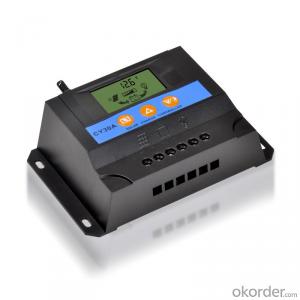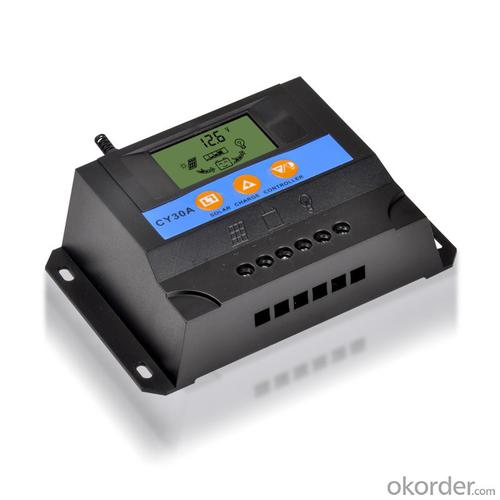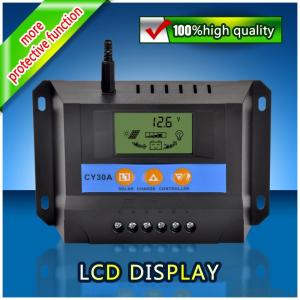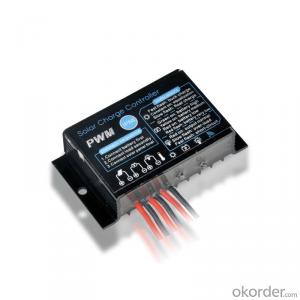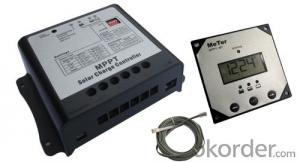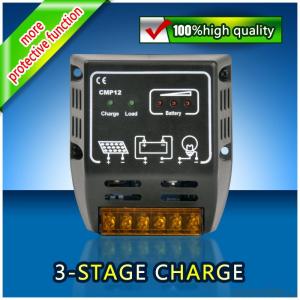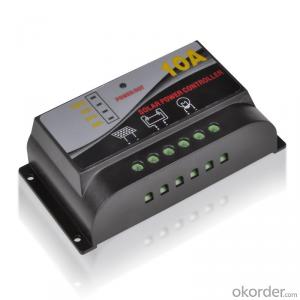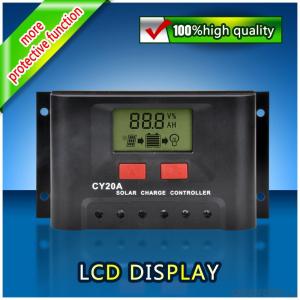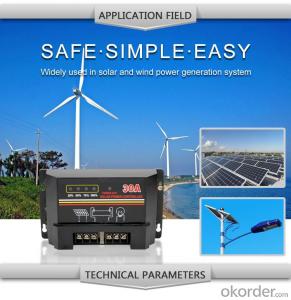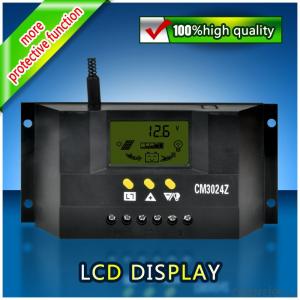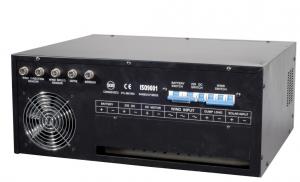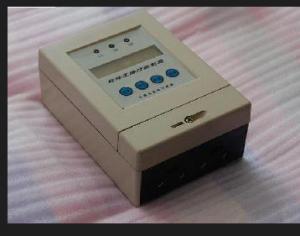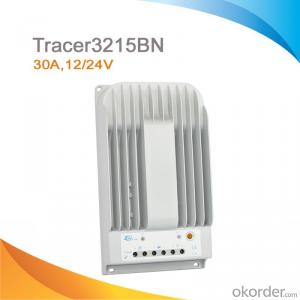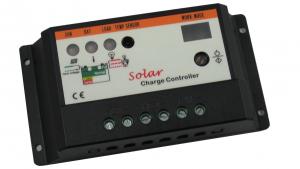Multiple Charge Controllers Solar LCD Controller CY50A with Best Price CY50A
- Loading Port:
- China main port
- Payment Terms:
- TT or LC
- Min Order Qty:
- 1 unit
- Supply Capability:
- 10000 unit/month
OKorder Service Pledge
OKorder Financial Service
You Might Also Like
Product Introduction
Solar controller is control device which can control solar panel and transform solar energy into electricity then store to the battery bank. Solar controller is the most important part in offgrid system, whose performance has much effect on life expectancy and operation of the whole system, especially the battery expectancy.
Application Areas
Standalone Photovoltaic power station
Standalone Domestic household photovoltaic power system
Mobil communication base stations, expressway and other non-residential regions.
Coastal islands, remote mountainous, border posts for regions shortage of or without electricity.
Government demonstration projects, landscape lighting project etc.
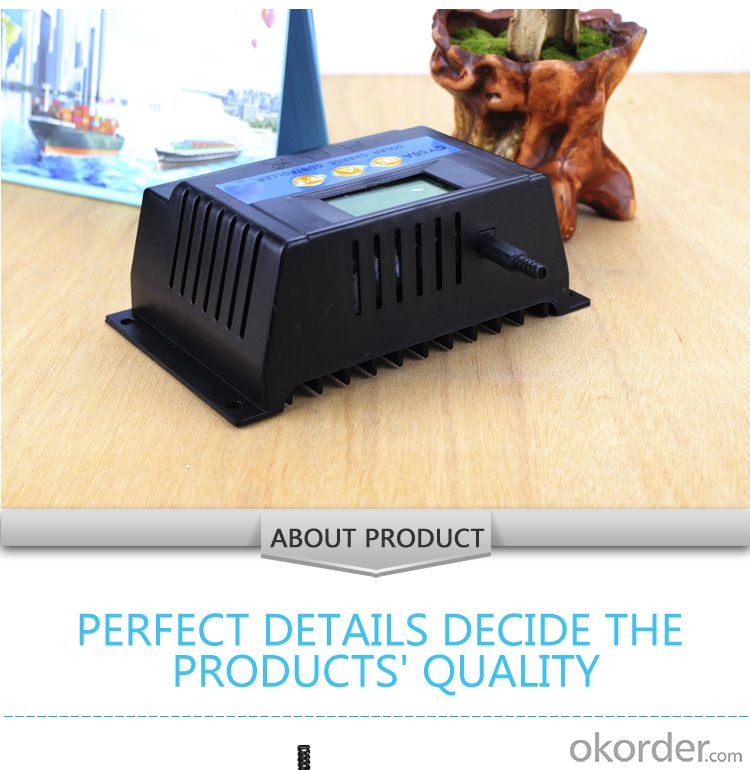
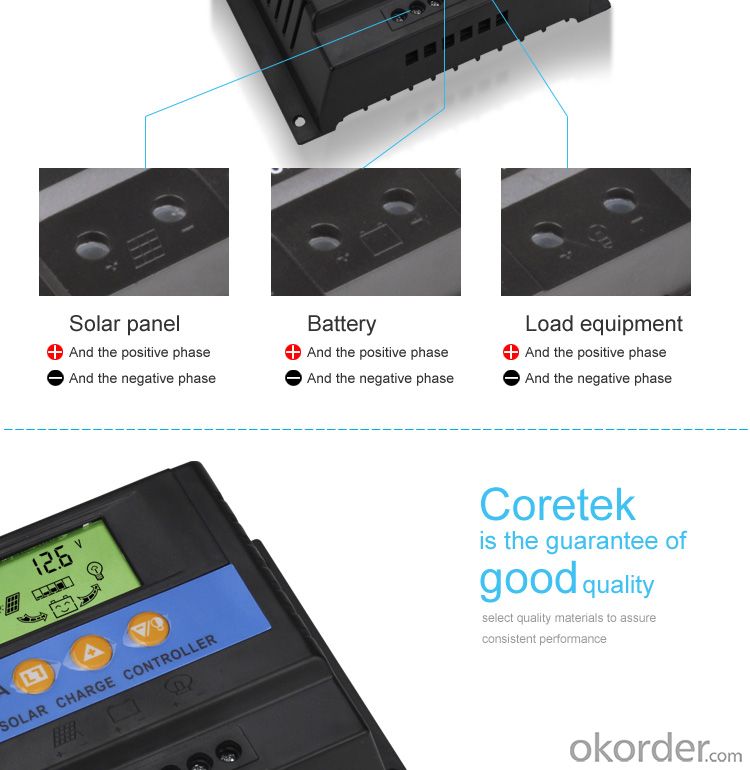
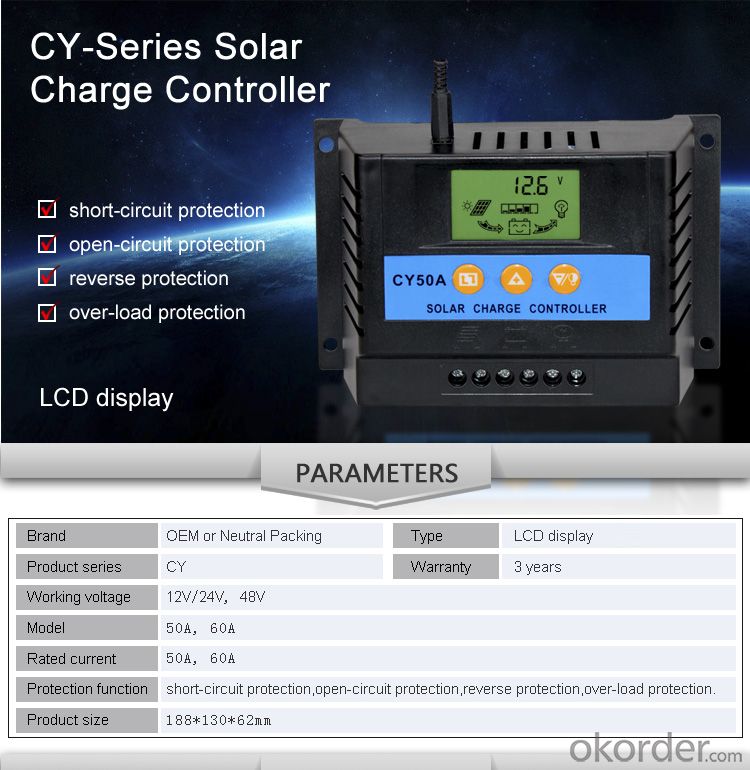
- Q: How do you prevent reverse current flow with a solar controller?
- A solar controller prevents reverse current flow by using diodes that only allow current to flow in one direction, from the solar panels to the battery. This ensures that any excess electricity generated by the panels does not flow back into the panels or damage the system.
- Q: How does a solar controller protect batteries from over-discharging?
- A solar controller protects batteries from over-discharging by monitoring the battery voltage and disconnecting the load when the voltage drops below a certain threshold. This prevents the battery from being drained excessively, which can lead to permanent damage and reduce its lifespan.
- Q: How does a solar controller handle battery desulfation?
- A solar controller handles battery desulfation by periodically applying a high voltage pulse to the battery, which helps break down and remove sulfation buildup on the battery plates. This process helps to rejuvenate the battery and improve its overall performance and lifespan.
- Q: What is the maximum load voltage in standby mode of a solar controller?
- The maximum load voltage in standby mode of a solar controller is typically the same as the system voltage, which is usually around 12V, 24V, or 48V, depending on the configuration of the solar power system.
- Q: Are there any maintenance requirements for solar controllers?
- Solar controllers do have maintenance requirements, although they are usually low-maintenance devices. To ensure optimal performance and longevity, it is recommended to regularly inspect and occasionally perform maintenance tasks. Keeping the solar controller clean and free from debris is an important maintenance requirement. This involves removing any accumulated leaves, dust, or dirt from the controller's surface. Regular cleaning helps prevent obstruction or shading of the solar panels, allowing them to efficiently capture sunlight. Periodically inspecting the wiring connections of the solar controller is also advised. Loose or corroded connections can disrupt the flow of electricity and decrease the controller's efficiency. Therefore, it is important to check for and tighten any loose connections, as well as clean any corrosion, to ensure uninterrupted power flow. Regularly monitoring the battery voltage is crucial for proper solar controller functioning. If the battery voltage drops below a certain level, it may indicate an issue with the battery or the charging system. In such cases, it is crucial to promptly address the problem to prevent any damage to the battery or the solar controller. Lastly, some solar controllers may require firmware updates or software upgrades periodically. These updates often include bug fixes, performance enhancements, or new features. It is advisable to follow the manufacturer's recommendations and install any available updates to keep the solar controller up to date. In conclusion, although solar controllers generally require minimal maintenance, it is important to perform regular cleaning, inspect wiring connections, monitor battery voltage, and install firmware updates to ensure optimal performance and longevity.
- Q: Can a solar controller be used with solar-powered indoor cooling systems?
- Yes, a solar controller can be used with solar-powered indoor cooling systems. The solar controller helps regulate and optimize the charging and discharging of the batteries used in the cooling system, ensuring efficient utilization of solar power.
- Q: How do I know if my solar controller is working properly?
- To determine if your solar controller is functioning properly, you can perform a few simple checks. Firstly, check if the controller's display is showing the expected information, such as battery voltage, charging status, or load settings. Secondly, verify that the controller is connected to the solar panels and battery system securely. You can also examine the controller for any physical damage or loose connections. Lastly, monitor if the controller is effectively regulating the charging and discharging of your batteries. If it appears to be correctly managing the power flow and maintaining the desired battery levels, then your solar controller is likely working properly.
- Q: Can a solar controller be used in a solar-powered water pump system?
- Yes, a solar controller can be used in a solar-powered water pump system. A solar controller helps regulate the flow of electricity from the solar panels to the water pump, ensuring optimal performance and protecting the system components from damage. It also helps monitor and maintain the battery charge, preventing overcharging or deep discharge. Overall, a solar controller is an essential component in a solar-powered water pump system to maximize efficiency and longevity.
- Q: Can a solar controller be used with solar panels of different ages?
- Yes, a solar controller can be used with solar panels of different ages. The purpose of a solar controller is to regulate the flow of energy from the solar panels to the battery or the grid. It does not depend on the age of the panels, rather it focuses on managing the energy generated by them. However, it is important to ensure that the voltage and current ratings of the solar controller are compatible with the solar panels being used to ensure optimal performance and prevent any damage to the system.
- Q: Can a solar controller be used with a solar-powered museum or gallery?
- Yes, a solar controller can be used with a solar-powered museum or gallery. A solar controller is an essential component of a solar power system that manages the flow of energy between the solar panels, batteries, and electrical loads. It helps regulate the charging and discharging of batteries, ensuring optimal performance and preventing overcharging or damage. In a solar-powered museum or gallery, a solar controller would play a crucial role in maintaining a stable and efficient power supply, maximizing the utilization of solar energy, and ensuring the longevity of the system.
Send your message to us
Multiple Charge Controllers Solar LCD Controller CY50A with Best Price CY50A
- Loading Port:
- China main port
- Payment Terms:
- TT or LC
- Min Order Qty:
- 1 unit
- Supply Capability:
- 10000 unit/month
OKorder Service Pledge
OKorder Financial Service
Similar products
Hot products
Hot Searches
Related keywords
